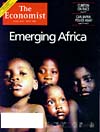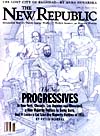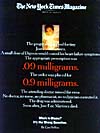
Economist, June 14
(posted Saturday, June 14)
Last week's New Republic declared that Africa is "dying." This week's Economist says that it is "emerging." The cheerful cover story and editorial observe that economies are growing across sub-Saharan Africa, commend the tough fiscal and free-market policies of new leaders, and urge the United States and Europe to lift tariffs on African exports. There's a bit of bad news, too. An essay by development-economics guru Jeffrey Sachs rates the importance of geography and climate to economic growth: Tropical regions (e.g., Africa) are enormously handicapped by their high rates of infectious disease and their low soil fertility. An 18-page survey predicts the globalization of the defense industry. Only international megacontractors such as Boeing have the economies of scale necessary to build expensive high-tech weapons. It also notes that China's defense industry is more primitive than recent publicity suggests.

Vanity Fair, July 1997
(posted Saturday, June 14)
Vanity Fair indicates that the Senate's campaign-fund-raising hearings could be the Watergate of the '90s if Sen. Fred Thompson can forge a bipartisan consensus for a deep investigation. But so far, the Democrats aren't cooperating and the Republicans have been ham-handed. (Full disclosure: the piece is co-authored by Slate's Jacob Weisberg.) Yet another VF article about Rupert Murdoch: It handicaps the race to succeed him. Twenty-five-year-old son Lachlan, who ranks highest in the News Corp. empire, is the favorite. But older daughter Elisabeth is tough and smart, and younger son James is the boldest thinker. The cover story gushes about gay divorcée Diana: She's freer, happier, and more devoted to charity than she was as Princess of Wales. And she still wears great clothes.

New Republic, June 30
(posted Friday, June 13)
The cover story lauds half a dozen big-city mayors as the potential saviors of American politics. New York's Rudolph Giuliani, Los Angeles' Richard Riordan, Chicago's Richard Daley, and other mayors are championing efficient government and free enterprise while opposing identity politics and income redistribution. These "new Progressives," who are simultaneously liberal and conservative, could inspire a new centrist political coalition. The "TRB" column parodies the truth-stretching Robert Reich, imagining him as Walter Mitty. (See Slate's "Robert Reich, Quote Doctor.") A writer travels to Baghdad and finds Iraqis despairing: Food and jobs are scarce, travel is impossible, and internal security is overbearing.

New York Times Magazine, June 15
(posted Thursday, June 12)
The cover story credits hospitals with improving their response to medical errors. Instead of finding scapegoats, they now encourage doctors and nurses to admit mistakes (no punishment attached) in order to prevent future ones. Problem: Malpractice lawyers profit when hospitals confess error. The magazine profiles the high-achieving Emanuel brothers: presidential adviser Rahm, Hollywood agent Ari, and medical ethicist Zeke. A competitive, intellectual upbringing made them obnoxious, passionate, smart, and fabulously successful. Also, a pair of Microsoft articles. One deplores "Microspeak," the company's hideous, responsibility-avoiding euphemisms: A bug, for example, is a "known issue." The other story suggests that the young pundits on MSNBC may represent a sea change in American politics. Their anti-government, anti-politics libertarianism could be the ideology of the future. Too bad no one's watching them.

Wired, July 1997
(posted Thursday, June 12)
Highly Panglossian. "The Long Boom" projects 25 years of global economic prosperity. Thanks to free markets and (of course) high technology, productivity will increase, environmental degradation will decrease, genetic diseases will be eradicated, and a worldwide, multicultural civilization will flourish. Possible obstacles: a plague, an ecological crisis, a U.S.-China war. The piece includes a "world history" chart for the years 1980-2020: "Immigrants drive revival of family" in 2014-16. "First designer kid" in 2020.

Time and Newsweek, June 16
(posted Tuesday, June 10)
Time and Newsweek publish identical cover headlines--"Should He Die?"--and nearly identical stories about Timothy McVeigh. Both say that America is eager for revenge and note that McVeigh is the ideal candidate for execution--remorseless, intelligent, well defended, white. Bud Welch, the father of an Oklahoma City victim, writes columns in Time and Newsweek about why he opposes McVeigh's execution. Time argues that the death penalty doesn't seem to deter crime, doesn't comfort victims' families, and is racially skewed. Time also has a creepy photo feature about prison death chambers.
Newsweek's package of stories on the military-and-adultery mess praises Defense Secretary William Cohen's effort to end the witch hunt, but faults him for defending Gen. Joseph Ralston and not a lower-ranking officer. Kelly Flinn--last week's poster girl for the issue--writes a piece condemning this double standard: Why was she ostracized and Ralston helped? The magazine profiles Anson Chan, the much-admired head of Hong Kong's civil service. She is the colony's "canary in a coal mine": If the Chinese stifle her, it will be a sure sign that Hong Kong is in trouble.
Time derides John Gray, the author of Men Are From Mars, Women Are From Venus, as an egomaniacal huckster who's making millions selling banalities to vulnerable couples.

U.S. News & World Report, June 16
(posted Tuesday, June 10)
The death penalty/McVeigh cover story also concludes that executions don't solace victims' families. A piece accuses the Japan External Trade Organization, a U.S.-based Japanese government agency, of snooping on U.S. companies in the United States. JETRO is supposed to promote U.S. exports to Japan, but actually helps Japanese companies acquire advanced American technology. U.S. News profiles a respected geologist whose computer models "prove" that the Biblical Flood occurred.

The New Yorker, June 16
(posted Tuesday, June 10)
TheNew Yorker chronicles the bitter fight over Kennewick Man, a skeleton with Caucasoid features discovered recently in Washington state. The 9,000-year-old skeleton is evidence that Europeans arrived in the United States before Native Americans, who migrated from Asia. Native Americans insist that the skeleton be reburied. The federal government has seized the bones and forbidden further scientific examination. An article discusses the popular idea of letting inner-city churches operate government welfare programs. Republicans are keen on this, but the church-state questions are tricky. If the churches proselytize, they may violate the First Amendment. If they don't proselytize, they may be ineffective.

Weekly Standard, June 16
(posted Tuesday, June 10)
The cover story worries that John Kasich is the future of the Republican Party. The House Budget Committee chairman is an eager beaver and a wonderful speaker, but he's too narcissistic, too populist, and too willing to compromise with Democrats. Also, the backlash against the Kenneth Starr backlash. Contrary to a recent New York Times Magazine story, the independent counsel is not to blame for the sluggish pace of the Whitewater investigation: Stonewalling by Clinton and his allies have impeded the probe.

The Nation, June 23
(posted Tuesday, June 10)
Computer databases make too much data available too easily, so the government must intervene to protect Internet privacy, argues the cover story. A piece defends New York City rent control. (For more on rent control, see Slate's "Such a Deal" and the "Dialogue" it sparked.) Press reports wrongly suggest that most beneficiaries of rent control are rich. In fact, it is mostly working-class folks who will be driven out of the city if the controls are lifted.
